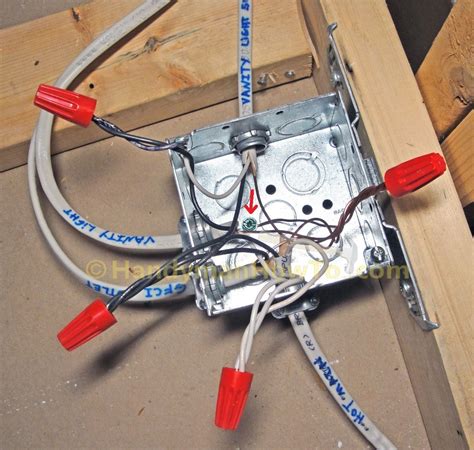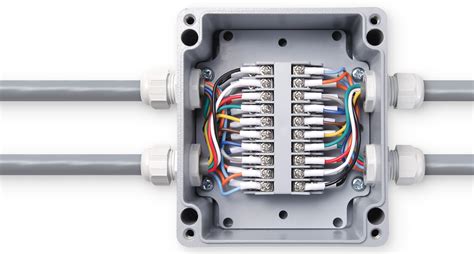acceptable electrical junction boxes If you install a box in a wet location, for example, you must use a box, fittings, and installation methods that are acceptable for wet locations. . Lunch Box: Made of superior food-grade stainless steel, material thick texture hard, no distortion, excellent durability. Perfect for putting salads, sandwiches, snacks. Lunch Bag: Felt + foil .
0 · where are junction boxes located
1 · types of electrical junction boxes
2 · screwfix junction box
3 · junction box wiring guidelines
4 · home wiring junction box options
5 · electrical wire connector junction box
6 · electrical junction box with terminals
7 · electrical junction box with connectors
This CANTEX PVC Junction Box Installation Video features animated installations of CANTEX PVC Electrical Junction Boxes. Learn more about wall and ground ins.
If you install a box in a wet location, for example, you must use a box, fittings, and installation methods that are acceptable for wet locations. .
The NEC has outlined specific requirements for junction boxes to ensure the safety and proper installation of electrical wiring systems. Here are some of the requirements that your business will need to follow.
If you install a box in a wet location, for example, you must use a box, fittings, and installation methods that are acceptable for wet locations. Fortunately, Art. 314 helps you select the right outlet, device, and junction boxes — and size them properly. When electrical cables route from box to box, you must leave at least six inches of free conductor wiring in the junction box for connection purposes. In article 300.14, this technique is explained. A junction box provides a safe, code-compliant space for housing cable connections for outlets, switches, or splices. They prevent potential electrical shocks, and keep sparks from spreading to flammable surroundings.For example, electrical metallic tubing (EMT) must be securely fastened within 3 feet of each outlet box, junction box, device box, cabinet, conduit body, or other tubing termination. [348-13] Where structural members do not readily permit fastening within 3 feet, unbroken lengths of EMT can be fastened within 5 feet. [348-13 Exception No. 1] As.
where are junction boxes located
You must size pull boxes, junction boxes, and conduit bodies large enough so a crew can install the conductors without damaging them. For conductors 4 AWG and larger, you size pull boxes, junction boxes, and conduit bodies per Sec. 314.28.
Non-metallic boxes, as well as oddly shaped/sized metal boxes, in the US are required to be permanently marked (labeled) with their "official" volume in cubic inches so that the correct box fill calculations can be run for them. This is Codified in NEC 314.16(A)(2): According to the National Electrical Code (NEC), all electrical boxes must be installed with matching covers. If you need help installing the box, call a professional. A junction box is not a special type of box but any standard electrical box used to enclose wire splices.
The sizing requirements for pull boxes, junction boxes, handhole enclosures, and conduit bodies exist to prevent conductor insulation damage. Those requirements are in 314.28, and they apply to all conductors 4 AWG and larger ( Fig. 1 ). A junction box is a standard electrical box that contains two or more spliced electrical cables. The box must have a removable, accessible cover. Junction boxes can be placed along electrical conduit, too.
types of electrical junction boxes
The NEC has outlined specific requirements for junction boxes to ensure the safety and proper installation of electrical wiring systems. Here are some of the requirements that your business will need to follow.
If you install a box in a wet location, for example, you must use a box, fittings, and installation methods that are acceptable for wet locations. Fortunately, Art. 314 helps you select the right outlet, device, and junction boxes — and size them properly. When electrical cables route from box to box, you must leave at least six inches of free conductor wiring in the junction box for connection purposes. In article 300.14, this technique is explained. A junction box provides a safe, code-compliant space for housing cable connections for outlets, switches, or splices. They prevent potential electrical shocks, and keep sparks from spreading to flammable surroundings.For example, electrical metallic tubing (EMT) must be securely fastened within 3 feet of each outlet box, junction box, device box, cabinet, conduit body, or other tubing termination. [348-13] Where structural members do not readily permit fastening within 3 feet, unbroken lengths of EMT can be fastened within 5 feet. [348-13 Exception No. 1] As.
screwfix junction box
You must size pull boxes, junction boxes, and conduit bodies large enough so a crew can install the conductors without damaging them. For conductors 4 AWG and larger, you size pull boxes, junction boxes, and conduit bodies per Sec. 314.28. Non-metallic boxes, as well as oddly shaped/sized metal boxes, in the US are required to be permanently marked (labeled) with their "official" volume in cubic inches so that the correct box fill calculations can be run for them. This is Codified in NEC 314.16(A)(2):
According to the National Electrical Code (NEC), all electrical boxes must be installed with matching covers. If you need help installing the box, call a professional. A junction box is not a special type of box but any standard electrical box used to enclose wire splices. The sizing requirements for pull boxes, junction boxes, handhole enclosures, and conduit bodies exist to prevent conductor insulation damage. Those requirements are in 314.28, and they apply to all conductors 4 AWG and larger ( Fig. 1 ).

junction box wiring guidelines

home wiring junction box options
electrical wire connector junction box
Check out our sheet metal union stickers selection for the very best in unique or custom, handmade pieces from our stickers shops.
acceptable electrical junction boxes|types of electrical junction boxes